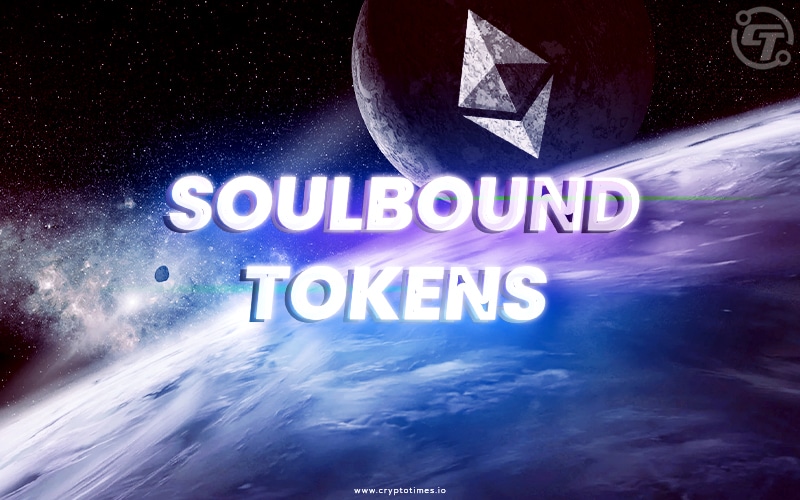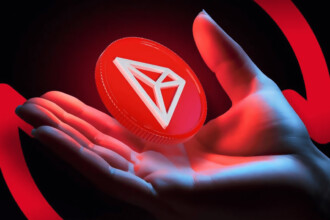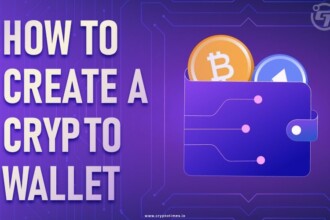Recently, Ethereum co-founder Vitalik Buterin released a whitepaper with a wide description of Decentralized Society (DeSoc) and Soulbound tokens (SBTs). The term “Soulbound” derived from the World of Warcraft game, was already discussed in his blog back in January.
The document claims to have a solution to define “social identity” in Web 3.0 and DeFi. While reading this 36-page document, I made some noteworthy observations and summarized them in this article.
What Are Soulbound Tokens (SBTs)?
SBTs or Soulbound tokens are non-transferable and publicly visible tokens linked to the soul address. It helps in creating social identity through tokens to enable the services currently absent in the Web 3.0 and DeFi ecosystem such as undercollateralized lending or simple contracts, like an apartment lease.
The digital address which carries SBTs or Soulbound tokens is called “Soul”.
“Out of Complexity, Find Simplicity”.
– Albert Einstein
Sometimes I think this quote is perfectly suitable for DeFi protocols and smart contracts. So, let’s try to understand via an easygoing example.
SBTs or Soulbound Tokens are just like your CV representing your skills and qualifications. By assessing details from your CV, such as your educational background, previous work history, and achievements, one can get an idea about your abilities and possible benefits that the company can get from your employment.
The SBTs, like CVs, help you develop your digital portfolio while maintaining your privacy. This portfolio strengthens your reputation among dApps, protocols, NFT marketplaces, and DAOs by enhancing your integrity. The presence of Soulbound Tokens in the Soul establishes trust, credentials, affiliations, and legitimacy for that particular account or soul.
Why Soulbound Tokens(SBTs) are needed?
Despite Web 3 and DeFi’s exponential growth in the short span, it’s still lacking at some points. Among these limitations, social identity, which brings trust factor in the traditional financial system is the major issue for Web 3.0 players.
“Don’t Trust Everything You See. Even Salt Looks Like Sugar”.
– Unknown
As human beings, we always grew up to transact or share something based on trust. From management to every financial transaction trust factors play a pivotal role. In the traditional financial system, banks grant loans based on the credit score, while MNCs hire a reputed person as a director of the board.
Right now, most Web 3.0 platforms and applications depend on the Web 2.0 platforms to mask their limitations such as:
- Provenance
Most NFT curators choose centralized platforms such as OpenSea and Twitter to maintain scarcity and provide wider provenance to their collections.
- Sybil Resistance
To prevent Sybil attack and transcend from coin-voting, DAOs rely on the web 2 social media profiles such as Discord server, Twitter, or others.
- Key Management
Because decentralized key management is not very user-friendly (not that it isn’t worthwhile), most DeFi players choose to store their digital assets on centralized platforms like Coinbase or Binance.
To replicate the economic value into Web 3 space and build a “Decentralized Society” (DeSoc), it becomes essential for current DeFi players to overcome these obstacles.
How do Soulbound Tokens or SBTs Work?
Soulbound tokens would be like an extended resume, issued by other wallets that attest to these social relations. Only SBT creators can issue them to other addresses, known as soul addresses. Once these tokens transfer to Soul, they will stick with that wallet address for the entire life span.
Unlike non-fungible tokens (NFTs), SBTs are not able to move on the secondary marketplace such as OpenSea.
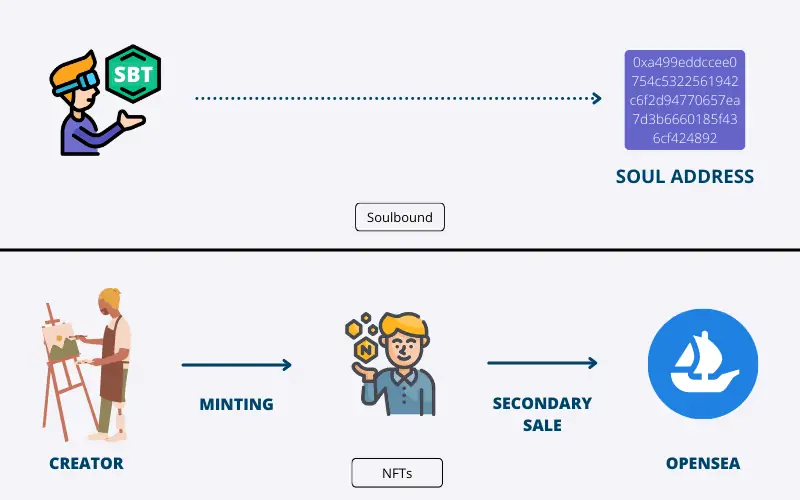
SBTs vs NFTs
The key difference between SBTs and NFTs are:
| SBTs | NFTs |
|---|---|
| SBTs are Non-transferable tokens and can not be transferred to a third party. | NFTs are transferable digital assets that enable users to buy and sell on the secondary marketplace such as Opensea. |
| SBTs can be used as proof, and even for NFTs. | NFTs only stick with Digital Art. |
| SBTs can be used as a proof-of-concept & social identity for NFT art, uncollateralized lending, or lease agreements. | Apart from digital collectibles, NFTs also unlock practical use cases such as ensuring the authenticity of products, real estate, medical records and identification, and so on. |
| SBTs contain a community recovery mechanism that defines Soul’s membership across different communities for recovery. | As NFTs belong to the digital asset category, it’s next to impossible for users to recover once it is lost or mistakenly transferred to anyone. |
| SBTs can provide Permissioning Access for documents, certificates and other legal agreements granted by any authorized entity. | NFTs can be used as passes or tickets in public and private events, without identity verification. |
Use Cases of Soulbound Tokens or SBTs
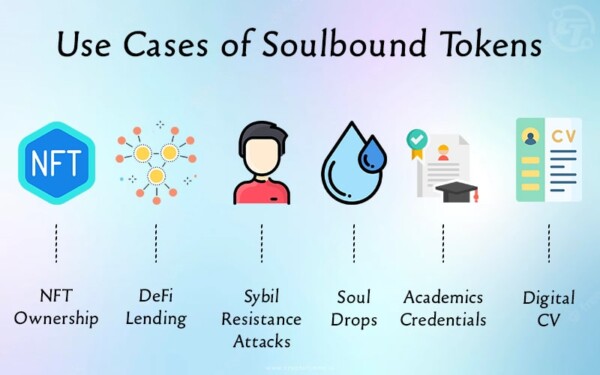
- NFT Art
NFT artists can link Soulbound tokens to their NFT collections, ensuring that NFT collectors know which tokens belong to them. By doing so, artists can eliminate bad actors from the NFT space who sell random NFT collections in the name of famous artists.
Artists could take a step further and issue a linked SBT stored in their Soul. Thus by attesting an SBT to NFT’s membership in a “collection” they can vouch for whatever scarcity limits the artist wishes to set.
In a nutshell, SBTs can help NFT creators and artists to build their reputations among the NFT and digital art community.
- DAOs
Implementation of SBTs or Soulbound Tokens in DAOs could prevent Sybil attacks. In the Sybil attack, the attacker acquires 51% voting power to pass the malicious proposal. These attacks are too dangerous for DAOs as they can provide direct access to attackers.
SBTs can mitigate this risk by computing over a Soul’s constellation of SBTs to differentiate between unique Souls and probable bots, and denying any voting power to a Soul that appears to be a Sybil.
- Uncollateralized Lending
Right now, uncollateralized lending in the DeFi space is not possible because of the anonymity element. For enterprises and protocols like Aave and Compound, it’s hard to count on random borrowers in the virtual network.
Currently, there is no mechanism available to identify the background or calculate credit scores of borrowers as conventional financials do.
- Certifications and Documentations
SBTs can also play a vital role in the future of documentation and certifications. As Soul can issue infinite Soulbound tokens, it has the potential to change the course of documentation from paper to paperless by bringing it to the digital network.
Institutions and universities can use SBTs to award degree certificates to graduates or undergraduates.
- Proof of Presence
SBTs can be used as proof of presence for special occasions, events, web conferences, seminars, or others. Also, by issuing SBTs to the limited person, the event organizer or host can call a controlled crowd for their purpose.
- Digital CV
Last but not the least, you can create your own SBTs and manage them according to your requirement to deal with different Web 3.0 platforms. Even SBTs can also reflect your skill set and abilities once it is added to your Soul. So, maybe in the future, SBTs could emerge as a digital portfolio or CV for Web 3.0 and DeFi consumers.
When will Soulbound Tokens (SBTs) launch?
According to Vitalik Buterin, Soulbound Tokens (SBTs) could be launched by the end of this year as an initial rollout. The launch will be a part of his ambitious vision to create a “decentralized society” by 2024.
Conclusion
Overall, after witnessing DeFi dominance over the last decade, we cannot deny that Web 3.0 has the potential to revolutionize every aspect of human existence, including finance. It does, however, have some restrictions, such as a lack of “Social Identity,” which can be remedied by SBTs or Soulbound Tokens.
I am convinced that integrating SBTs into the Web 3.0 area will place human interactions at the center of the DeFi, allowing financial services such as uncollateralized loans and lease agreements to be unlocked. I’m hoping that the new Web 3.0 financial infrastructure will protect the conventional economy’s value.


